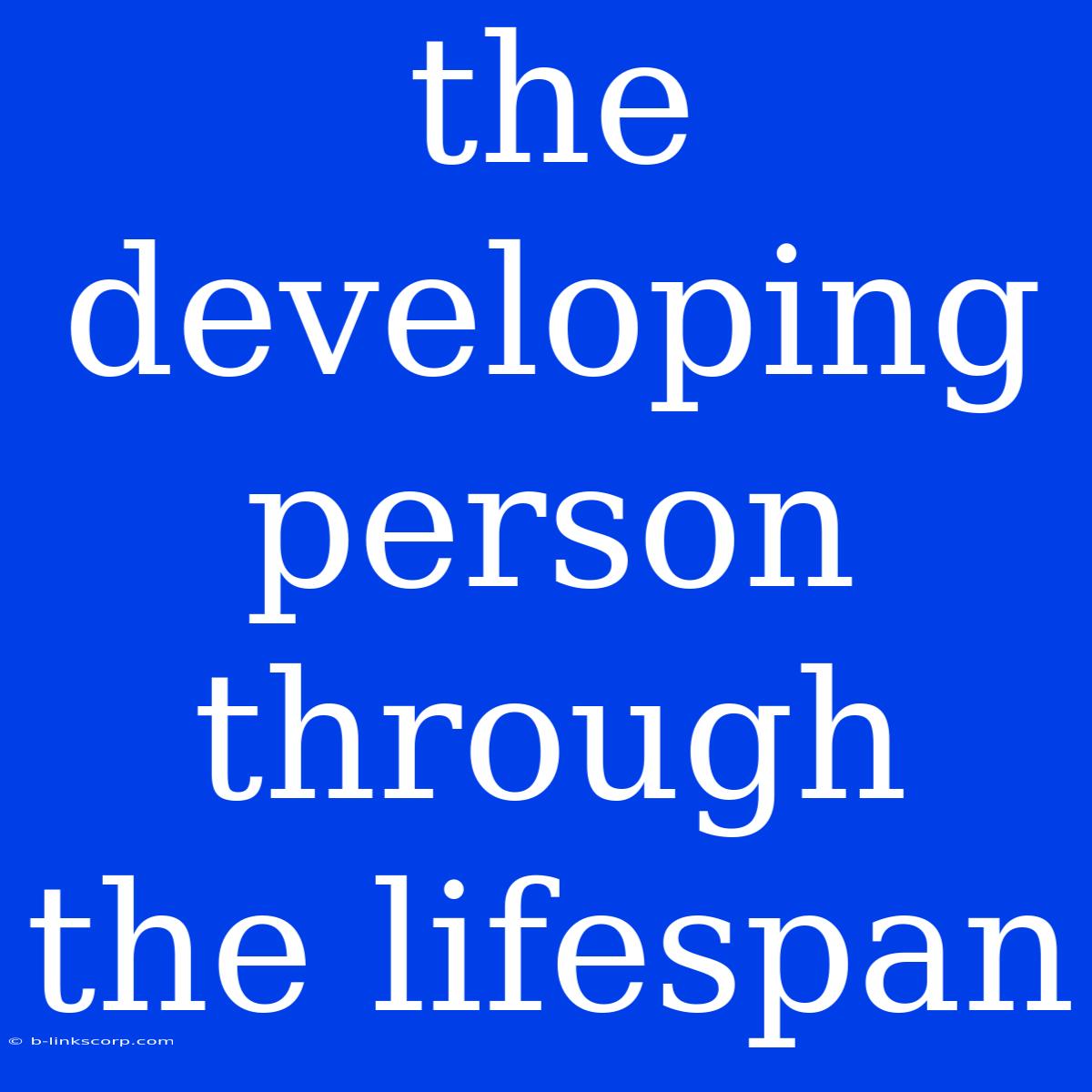The Developing Person Through the Lifespan: A Journey of Growth and Change
The human lifespan is a remarkable journey, marked by continuous growth, change, and adaptation. From the moment we are conceived to the time we take our last breath, we are constantly evolving in both body and mind. Understanding these developmental processes across the lifespan is crucial for appreciating the complexities of human existence and for fostering healthy, fulfilling lives.
Understanding Lifespan Development
Lifespan development encompasses the study of how individuals change and grow throughout their lives, from conception to death. It explores various domains of development, including:
- Physical Development: Changes in our bodies, including height, weight, motor skills, and bodily systems.
- Cognitive Development: Changes in our mental abilities, such as thinking, learning, memory, and problem-solving.
- Social Development: Changes in our interactions with others, including our relationships, social skills, and sense of self.
- Emotional Development: Changes in our feelings, how we express them, and how we manage them.
Stages of Lifespan Development
Lifespan development is often divided into distinct stages, each characterized by unique challenges, opportunities, and milestones. While these stages are broadly recognized, it is important to remember that individual development is fluid and can vary significantly.
1. Prenatal Development (Conception to Birth): This stage is characterized by rapid growth and development, with the fetus forming organs, systems, and essential structures.
2. Infancy and Toddlerhood (Birth to 2 Years): This is a time of significant physical, cognitive, and social development. Infants develop basic motor skills, learn to communicate, and form early attachments.
3. Early Childhood (2 to 6 Years): Language skills develop rapidly, and children become increasingly independent. They begin to understand concepts like sharing and cooperation and develop a sense of self.
4. Middle Childhood (6 to 11 Years): This stage sees the development of more complex social skills, including friendships, teamwork, and group dynamics. Children learn new academic skills and develop a sense of self-esteem.
5. Adolescence (11 to 18 Years): This is a period of rapid physical, cognitive, and emotional changes. Adolescents experience puberty, develop abstract thinking skills, and grapple with identity formation.
6. Emerging Adulthood (18 to 25 Years): This stage is a transitional period between adolescence and adulthood. Young adults explore their identity, establish careers, and build relationships.
7. Early Adulthood (25 to 40 Years): This stage is typically characterized by career development, relationship commitments, and family formation.
8. Middle Adulthood (40 to 65 Years): This stage often involves career advancement, the launching of children into adulthood, and potentially facing the challenges of aging parents.
9. Late Adulthood (65 Years and Beyond): This stage is marked by physical, cognitive, and social changes related to aging. Individuals face challenges such as retirement, health issues, and the loss of loved ones.
Factors Influencing Development
Development throughout the lifespan is influenced by a complex interplay of factors:
- Nature: Our genes and biological inheritance play a significant role in shaping our development.
- Nurture: Our environment, including family, culture, and experiences, significantly impacts our growth.
- Historical Context: The social and cultural context in which we develop influences our values, beliefs, and behaviors.
The Importance of Lifespan Development
Understanding lifespan development has numerous benefits:
- Understanding Human Behavior: By studying the developmental processes, we gain valuable insights into human behavior across the lifespan.
- Promoting Healthy Development: This knowledge can be used to develop programs and interventions that promote healthy development and well-being.
- Effective Education and Parenting: It provides insights into effective educational practices and parenting styles that support children's growth.
- Social Policy: The understanding of lifespan development informs social policies related to education, health, and aging.
Conclusion:
The developing person through the lifespan is a fascinating and complex journey. It involves a constant interplay of biological, social, and psychological factors that shape us into the individuals we become. By understanding these processes, we can better appreciate the diversity and richness of human experience and work towards creating a society that supports healthy and fulfilling lives for all.

